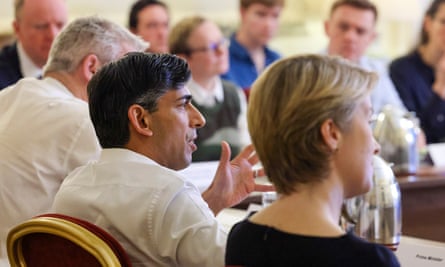Tory right warns Rishi Sunak: this is the calm before our storm over small boats and Brexit | Rishi Sunak
Senior Tories are warning Rishi Sunak that he is enjoying the “calm before the storm”, with his own MPs already plotting to tackle him over immigration and a beleaguered plan to secure “Brexit freedoms”.
The prime minister spent Saturday attempting to show his commitment to easing the crisis in the NHS – one of the five pledges he made in his new year’s speech – by holding a summit with health services figures. Delays to discharging people from hospital, social care shortages, an A&E crisis and waiting lists were all discussed at the “NHS recovery forum”. Sunak told those attending that “boldness and radicalism” would be needed to solve the pressures.
He has also invited unions in for talks with government departments on Monday about next year’s pay settlements, as he battles to end rolling NHS, rail and postal strikes that have represented the biggest wave of industrial action in decades.
However, as his team attempts to restore relative political calm, the prime minister is being publicly warned by the right of his party that his authority rests on a pledge to remove most EU-derived laws by the end of the year – a plan expected to be blocked in the House of Lords. Other Tories are already preparing to amend promised new laws to tackle the issue of small boats crossing the Channel, with some planning to target the influence of the European court of human rights.
Close allies of former prime ministers Boris Johnson and Liz Truss are among those already agitating over Sunak’s direction, with some warning in private that he has to show significant progress by the spring to avoid a fresh outbreak of internal warring that rocked the Conservatives last year.
Sunak allies said he would now spend much of the next year trying to erase the memory of “perma-crisis” in the party. However, several Tories already believe that the key issues of small boats and Brexit are likely to cause immediate problems before May’s local elections.
“Sunak’s got to take risks, but it is not in his nature and he has a risk-averse chancellor,” said a former cabinet minister. “You get to May and a bad election result, then get the 2019 ‘red wall’ intake seriously concerned about their seats. That’s when it’s all going to kick off. It really is the calm before the storm at the moment.”
With Tory MPs increasingly worried that support will rise for the Reform party, figures on the right are focusing on a pledge to remove most EU laws from the statute book by the end of the year. There have been persistent rumours that the retained EU law bill will be watered down, with officials warning that it is a time-consuming, unpredictable and potentially dangerous exercise.

Jacob Rees-Mogg, the former business secretary who championed the bill, told the Observer: “The mandate from voters in 2019 was ‘to get Brexit done’ and to begin harvesting the fruits of independence. Leaving EU levels of over-regulation on our statute book does not do this so lets down electors.” David Jones, a former Brexit minister, warned Sunak that his authority “rests upon it being completed successfully”. He added that “the future of the Conservative party” was at stake.
“I was proud in 2019 to stand on a manifesto of getting Brexit done and delivering on its opportunities, founded on the support of many thousands of working-class voters who had been wounded by Labour’s historic betrayal on Brexit,” he said. “We must deliver on it.”
Labour and the Tories will be conducting an election campaign at a time when many households are becoming poorer and a gap is opening up between those with the highest and lowest incomes – a dynamic likely to heap pressure on Keir Starmer and Sunak to increase taxes on those benefiting.
Fast rising interest rates mean that households with a mortgage will have seen their incomes plummet by 12% over two years by the time of the next likely election date, while the richest 5% of households will actually see their incomes rise.
Despite predictions of falling inflation, new cost of living research, published by the Resolution Foundation thinktank on Monday, shows the impact of interest rates increasing from 0.25% in January to 3.5% in December. It is currently expected to peak at 4.6% in October 2023, ensuring many will remain in the teeth of a cost of living crisis as the election approaches. The average mortgagor household in this position faces a £3,000-a-year increase in their mortgage costs. Their typical incomes are set to fall by 12% between 2021-22 and 2023-24.
Much of the surge in savings and investment from higher interest rates income next year will be captured by the richest 5% of households, seeing their incomes rise by 4% this year and next – even while the rest of the country gets poorer. However, their assets, including their homes, may fall in value.






